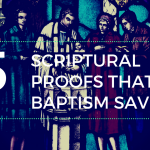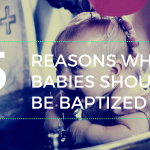I just came across an article posted on the 9Marks blog titled, “Waters that Unite: Five Truths About Water Baptism” (you can find it here). The article itself is pretty standard from a Baptist or non-denominational evangelical approach, arguing that baptism must follow faith, that it is a public profession, etc. The reason why I decided to respond to this article is because of the argument made in the second of these points, because it is exemplary of a broader problem with many readings of the sacramental texts in the New Testament.
The point he makes is this: “Baptism doesn’t save; it announces salvation.”
The argument that is presented against any notion of baptismal efficacy is taken from 1 Corinthians 1:14-16, wherein Paul writes the following:
“I thank God that I baptized none of you except Crispus and Gaius, lest anyone should say that I baptized in my own name. Yes, I also baptized the household of Stephanas. Besides, I do not know if I baptized any other.”
I encounter this objection quite often in discussions surrounding the nature and purpose of baptism, which I find odd for a couple of reasons. First, it is a general hermeneutical rule that a doctrine should be based primarily on texts which actually address that particular doctrine explicitly. Second, the implications drawn from the text by those from a Baptist perspective are simply unwarranted. Regarding the first point, those who object to baptismal regeneration hardly ever base their argument foundationally upon texts which use such language. Several texts in the New Testament explicit address the question: “what exactly does baptism do?” However, those who object to baptismal efficacy do not generally use such texts as the foundation for their perspective. Instead, other truths are first asserted, and then the clear baptismal texts are read through whatever convictions one has come to regarding the implications of other texts or doctrines. The most common arguments I hear are these:
“But, the thief on the cross was saved without being baptized!”
“But Paul says that he thanked God that he did not baptize anyone in Corinth. Therefore, it couldn’t be saving!”
“But some p eople are baptized and then don’t live a Christian life afterward!”
eople are baptized and then don’t live a Christian life afterward!”
“But Paul said that salvation is by faith, and baptism isn’t faith!”
While these issues are ones that should be discussed, and have been answered ad infinitum, none of them actually address what the text states about baptism itself. One’s position on a doctrine should not be based on “if x, therefore y,” reasoning, but instead primarily on those texts which actually address the subject directly. Certainly, implications can then play into debate, but only secondarily. This article is a great example of this problem.
David Schrock (the author of this article), writes the following regarding his contention that baptism is not saving:
More theologically, Paul’s words reveal that baptism is not salvific—i.e., baptism does not grant or guarantee salvation; it announces salvation. If baptism effected salvation (as in the erroneous doctrine of “baptismal regeneration”) he would not be able to say: “I’m glad I baptized only a few.” He can only say this if baptism symbolizes the real thing.
Therefore, we conclude from this verse (and the rest of the New Testament), baptism doesn’t confer or complete salvation; it announces the antecedent, already-present gift of salvation.
Again, this particular passage in Paul cites nothing specific whatsoever regarding what the effect of baptism is. He simply says that he is glad that he himself did not baptize many in Corinth. This then is used by Shrock to prove that baptism does not save. Step back for a moment, however, and examine the text itself. When this is done, Shrock’s argument is not so convincing.

First, in verse 17, Paul says that he was not sent by Christ to baptize, but instead to preach the gospel. This is taken to mean that because Paul was not the one baptizing, therefore it could not be a saving act. However, that conclusion is simply unwarranted. Christ gave Paul a very particular mission: to preach the gospel. Apparently, there were others who were with Paul that were performing the baptisms. The fact that this was not Paul’s mission does not mean that it wasn’t someone else’s, or that it wasn’t all that important. This is about as reasonable as saying that a congregation has multiple pastors, and one particular pastor (lets call him pastor A) is the one who preaches on most occasions. Therefore, since pastor B wasn’t called to preach on most occasions, the word of God must not really have any saving power. If it did, then he would be the one preaching. The conclusion simply does not follow.
Second, the entire context of Paul’s statement points to a much higher view of baptism than a purely symbolic one. In this chapter, Paul cites extensive divisions within the congregation. These divisions were partially due to the particular individuals who had baptized the congregants in the Corinthian church. The question I pose here is: if baptism were understood as a purely symbolic act, would the person performing that act be so important to the one baptized? Is it not more reasonable to assume that the reason why this division was so strong is precisely because baptism was viewed by the Corinthians as a saving act? This is why Paul is thankful that he was not sent to baptize. Not because baptism does not save, but because it does save, and he feared that because he would be performing such a saving act, people would view him as their savior rather than Christ. Paul distances himself from Christ, by informing them that he was not crucified, and that no one was baptized in his name. The whole point is that these people viewed the one baptizing them as a kind of savior. This is nearly inconceivable if baptism was viewed as symbolic.
Third, and most problematic, is that this argument is made without any reference whatsoever to all of the numerous texts which speak strongly about baptismal efficacy (you can find a discussion of those texts here). Schrock simply states, “baptism doesn’t save,” when St. Peter says, “baptism now saves you” (1 Peter 3:21). This is no mere isolated text, but similar language is found in Acts 2:38, Romans 6:3-4, Acts 22:16, etc. He does not even address such texts here, which state exactly the opposite of Schrock’s contention. The argument simply fails.
The point here is not to go after Davis Schrock who, to be fair, only gave a very short statement on that subject. He may perhaps speak more extensively on the subject elsewhere. However, this short article is exemplary of the kinds of short and dismissive arguments that often happen in these discussions surrounding sacramental efficacy. If one wants to contend that baptism really does not save (and do so convincingly) then they must actually engage the texts which speak about the subject.










